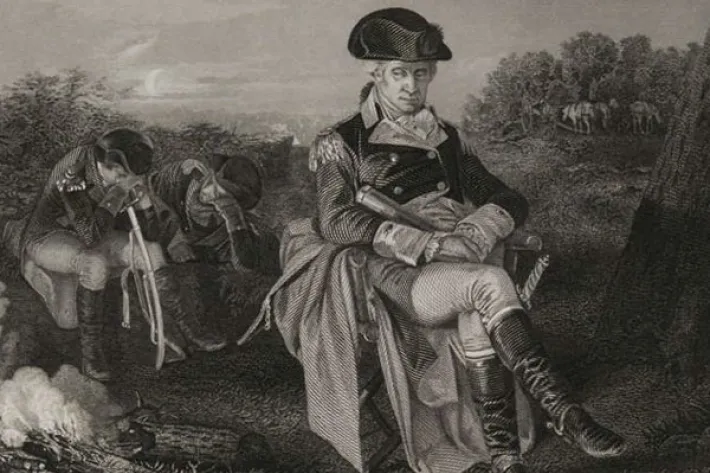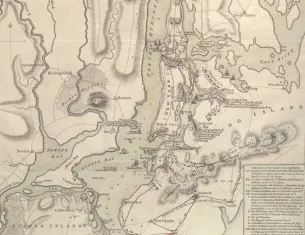Report to the Continental Congress on the Battle of Long Island, 1776

"The Bivouac at Monmouth," engraving based on original painting by Alonzo Chappel, 1856. (The Gilder Lehrman Institute of American History)
On August 20, 1776, British forces crossed from Staten Island to Long Island in New York harbor. Washington’s 23,000 troops faced Howe’s 20,000 troops. On August 27, Howe attacked American forces on Long Island, and the American lines retreated. Robert H. Harrison, one of Washington’s aides, wrote to Congress with news of the day’s battle.
A Report from Robert Hanson Harrison to John Hancock, August 27, 1776
Sir
New York Augt 27. 1776 Eight OClock. P.M.
I this minute returned from our Lines on Long Island where I left his Excellency the General. From him I have It in command to inform Congress, that on Yesterday he went there & continued till the Evening, when from the Enemy’s landing a considerable part of their Forces & many of their movements there was reason to apprehend they would make in a little time a Genl Attack. — As they would have to pass thro a wood before they could approach our Lines, It was thought expedient to place a number of Men there on the different Roads leading from whence they were stationed in order to harrass and annoy them in their March—This being done, early this Morning a Smart engagement ensued between the Enemy and our Detachments, which continued with [illegible] till the [illegible] moon, who being unequal to the force they had to contend with have sustained a pretty considerable loss—At least many them are missing, among whom areare Genls Sullivan & Lord Stirling—The loss of the Enemy is not known certainly, — but we are told by such of the Troops that were Engaged there that got off that they had many killed and wounded—They brought off Lieutt, Serjeant, and Corporal with 20 privates, prisoners. While These Detachments were engaged, a Column of the Enemy descended from the Woods & marched towards the Center of our Lines with a design to make an Impression but were repulsed—This Evening they appeared very numerous about the Skirts of the Woods went to our Lines where they have pitched many Tents, and his Excellency Inclines to think they mean to attack & make an impression by regular approaches rather than in any other manner. Today 5 Ships of the Line came up towards the City where they seemed desirous of getting as they turned a long time against an unfavourable Wind, & on my return to head Quarters tonight I found a Deserter from the 23d Regmt, who Informed me that they design as soon as the Wind will permit em to come to give us a Severe Cannonade & to Silence the several Batteries, If possible. I have the Honor to be in great Haste:
Sir
Your Most &ct
RHH
Source: Robert Hanson Harrison to John Hancock, August 27, 1776, Library of Congress
A Report from Robert Hanson Harrison to John Hancock, August 27, 1776
Sir
New York Augt 27. 1776 Eight OClock. P.M.
I this minute returned from our Lines on Long Island where I left his Excellency the General. From him I have It in command to inform Congress, that on Yesterday he went there & continued till the Evening, when from the Enemy’s landing a considerable part of their Forces & many of their movements there was reason to apprehend they would make in a little time a Genl Attack. — As they would have to pass thro a wood before they could approach our Lines, It was thought expedient to place a number of Men there on the different Roads leading from whence they were stationed in order to harrass and annoy them in their March—This being done, early this Morning a Smart engagement ensued between the Enemy and our Detachments . . . who being unequal to the force they had to contend with have sustained a pretty considerable loss—At least many them are missing, among whom are are Genls Sullivan & Lord Stirling—The loss of the Enemy is not known certainly, — but we are told by such of the Troops that were Engaged there that got off that they had many killed and wounded . . . This Evening they appeared very numerous about the Skirts of the Woods went to our Lines where they have pitched many Tents, and his Excellency Inclines to think they mean to attack & make an impression . . . on my return to head Quarters tonight I found a Deserter from the 23d Regmt, who Informed me that they design as soon as the Wind will permit em to come to give us a Severe Cannonade & to Silence the several Batteries, If possible. I have the Honor to be in great Haste:
Sir Your Most &ct
RHH
Source: Robert Hanson Harrison to John Hancock, August 27, 1776, Library of Congress
expedient - urgent
whence - where
smart - quick, prompt
ensued - happened
batteries - artillery units
haste - rush, hurry
Background
On August 20, 1776, British forces crossed from Staten Island to Long Island in New York harbor. Washington’s 23,000 troops faced Howe’s 20,000 troops. On August 27, Howe attacked American forces on Long Island, and the American lines retreated. Robert H. Harrison, one of Washington’s aides, wrote to Congress with news of the day’s battle.
Transcript
A Report from Robert Hanson Harrison to John Hancock, August 27, 1776
Sir
New York Augt 27. 1776 Eight OClock. P.M.
I this minute returned from our Lines on Long Island where I left his Excellency the General. From him I have It in command to inform Congress, that on Yesterday he went there & continued till the Evening, when from the Enemy’s landing a considerable part of their Forces & many of their movements there was reason to apprehend they would make in a little time a Genl Attack. — As they would have to pass thro a wood before they could approach our Lines, It was thought expedient to place a number of Men there on the different Roads leading from whence they were stationed in order to harrass and annoy them in their March—This being done, early this Morning a Smart engagement ensued between the Enemy and our Detachments, which continued with [illegible] till the [illegible] moon, who being unequal to the force they had to contend with have sustained a pretty considerable loss—At least many them are missing, among whom areare Genls Sullivan & Lord Stirling—The loss of the Enemy is not known certainly, — but we are told by such of the Troops that were Engaged there that got off that they had many killed and wounded—They brought off Lieutt, Serjeant, and Corporal with 20 privates, prisoners. While These Detachments were engaged, a Column of the Enemy descended from the Woods & marched towards the Center of our Lines with a design to make an Impression but were repulsed—This Evening they appeared very numerous about the Skirts of the Woods went to our Lines where they have pitched many Tents, and his Excellency Inclines to think they mean to attack & make an impression by regular approaches rather than in any other manner. Today 5 Ships of the Line came up towards the City where they seemed desirous of getting as they turned a long time against an unfavourable Wind, & on my return to head Quarters tonight I found a Deserter from the 23d Regmt, who Informed me that they design as soon as the Wind will permit em to come to give us a Severe Cannonade & to Silence the several Batteries, If possible. I have the Honor to be in great Haste:
Sir
Your Most &ct
RHH
Source: Robert Hanson Harrison to John Hancock, August 27, 1776, Library of Congress
Excerpt
A Report from Robert Hanson Harrison to John Hancock, August 27, 1776
Sir
New York Augt 27. 1776 Eight OClock. P.M.
I this minute returned from our Lines on Long Island where I left his Excellency the General. From him I have It in command to inform Congress, that on Yesterday he went there & continued till the Evening, when from the Enemy’s landing a considerable part of their Forces & many of their movements there was reason to apprehend they would make in a little time a Genl Attack. — As they would have to pass thro a wood before they could approach our Lines, It was thought expedient to place a number of Men there on the different Roads leading from whence they were stationed in order to harrass and annoy them in their March—This being done, early this Morning a Smart engagement ensued between the Enemy and our Detachments . . . who being unequal to the force they had to contend with have sustained a pretty considerable loss—At least many them are missing, among whom are are Genls Sullivan & Lord Stirling—The loss of the Enemy is not known certainly, — but we are told by such of the Troops that were Engaged there that got off that they had many killed and wounded . . . This Evening they appeared very numerous about the Skirts of the Woods went to our Lines where they have pitched many Tents, and his Excellency Inclines to think they mean to attack & make an impression . . . on my return to head Quarters tonight I found a Deserter from the 23d Regmt, who Informed me that they design as soon as the Wind will permit em to come to give us a Severe Cannonade & to Silence the several Batteries, If possible. I have the Honor to be in great Haste:
Sir Your Most &ct
RHH
Source: Robert Hanson Harrison to John Hancock, August 27, 1776, Library of Congress
expedient - urgent
whence - where
smart - quick, prompt
ensued - happened
batteries - artillery units
haste - rush, hurry
